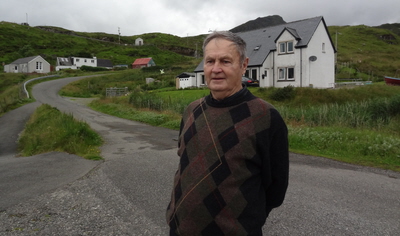An isolated village's fight for survival is recalled in a new book.
Rhenigidale in Harris was the last settlement in Scotland to be linked by road.
In an emergencies, it could take days for a doctor to arrive. Stores and supplies had to be shipped in by fishing boat and manhandled ashore.
Overland access was a hazardous mountain track where villagers had to negotiate steep zigzags on a four mile trek to Tarbert.
It is known as the postman’s road as the Rhenigidale mailman would transverse the track to collect and return with letters three times a week.
Kenny Mackay -
He also led the fight for a road to be built, to secure the future of his village.
Twenty six years ago, in 1990, a single track road was finally built. Blasting through hard rock to carve a route through a mountain to link the community with the outside world cost £1.5 million.
Without it the tiny close knit community would have abandoned their homes, leaving the place derelict and deserted says Mr Mackay who raised his family in the village.
The “injustice” of villagers fighting in both world wars yet never getting the “land fit for heroes” they were promised planted the seed.
But it was the stark worry of seeing the population hurtling downwards towards single figures which gave them the push to campaign for the road.
Survival of the village hung on a knife-
He said: “The place was I saw the population going down and it there was a final spurt to see if we could win the battle for the road.
“Without the road it would be just ruins.”
Having a secure road to the outside world allowed peace of mind for the first time.
When his father suddenly fell ill and needed medical attention urgently, there was no way of the doctor getting to see him. Sea conditions were too rough to land by boat and the sick patient had to wait another day until the weather improved.
Mr Mackay said: “We could never have survived if it wasn’t for the support of the Scalpay fishermen coming in with their boats. We couldn’t have.“
They risked their livelihoods if their boats got damaged on rocks when navigating towards the shore, he said.
Before the telephone came in to the village they had to walk over the mountain to Tarbert to get a nurse or doctor, often in the dark.
Mr Mackay said: “It was a risky staying but we’ve survived it to now and its been a success.”
“I would have been out years ago if it was not for the road.“
The population stood at nearly 100 in the 1880s following the clearances of the early 19th century when crofters evicted from elsewhere were resettled in Rhenigidale.
Numbers plummeted to just ten residents, many elderly, before the road was built.
Some 15 people are currently resident in the community including young children. Eleven live in the actual village of Rhenigidale plus a family of four who have built a house by the new road just on the other side of the village boundary.
Among the tiny population are three generations of one family.

Kenny Mackay
Recalling a community's fight for survival
3 August 2016